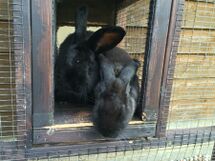Rabbits outdoors
This article is incomplete because it lacks depth or is unfinished. Help by expanding it.
While many rabbits will enjoy having more space to run about outdoors, and the vitamin D they can generate from direct sunlight is beneficial to their health, it is important to provide a safe environment as well as evaluate the potential dangers if you choose to do so.
Considerations before taking your rabbit outdoors
- Do you have a safe outdoor enclosed space without aggressive cats, wildlife, or unleashed dogs? While a predator-proof enclosure is essential especially for unsupervised rabbits, rabbits can also be fatally frightened through fencing. Without a predator-proof enclosure, it can still be very risky because you will absolutely need to have eyes on your rabbit's surroundings to ward off predators the entire time, as a passing cat or hawk can easily immediately seriously injure your rabbit before you can react. Some rabbits may be amicable to walking your rabbit on a leash, but you cannot control what other animals like unleashed dogs will do if you take your rabbits to a public space instead of a private yard.
- Are your rabbits up-to-date on any vaccinations available in your country? RHD and myxomatosis are horrible fatal diseases that have no cure. As a result, it is especially important to be current on any available vaccinations before you allow your rabbits outside.
- Are you prepared to deal with fleas, mites, ticks, flystrike, and other parasitic diseases if your rabbit goes outside? While many of these issues are treatable, diseases such as flystrike can be extremely dangerous. Issues such as raccoon roundworm have no cure and may have lifelong neurological symptoms, so consider if you are willing to deal with the consequences if it occurs.
- Are all the plants where your rabbit has access to safe for rabbits to eat? Domestic rabbits do not know what plants are toxic and will nibble on all sorts of plants, even if they are detrimental to their health. Many public spaces may be filled with other animal feces that can pass along diseases, and plants may be treated with pesticides and weed killers that should not be ingested by rabbits.
- What is the weather like? Rabbits are easily susceptible to heatstroke on hot days and should have an area that is out of direct sunlight to rest in. While rabbits are better at handling cold weather with their thick fur coat, they should still have a space out of any wind to warm up. Rabbits can handle some light rain showers, but they should not be allowed to be soaked to the skin as their fur coat takes an extremely long time to dry and can give them hypothermia.
Rabbit runs
Rabbit runs are a safe outdoor exercise space that allows rabbits to run, jump, and generally stretch their legs and play. These enclosures need to be predator-proof from all angles including the top, and making sure that rabbits cannot dig out when unsupervised for long periods of time is also important.
The following links contain more information about setting up outdoor rabbit runs.
- The Rabbit House. The Rabbit Run
- Beth Woolbright. (2006). Great Outdoor Exercise Set-Ups
- Marinell & Robert Harriman. (1989). Your Basic Rabbit-Run
Further reading
- House Rabbit Society. Rabbits Outdoors
- My House Rabbit. Taking Your House Rabbit Outdoors
- Holly O'Meara. (2013). Outdoor and Indoor Hazards
- Rabbit Rescue, Inc. Outdoor Dangers for Rabbits


